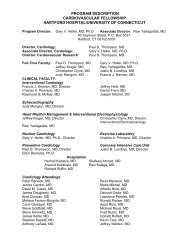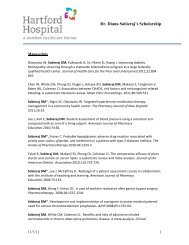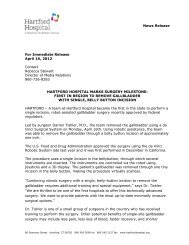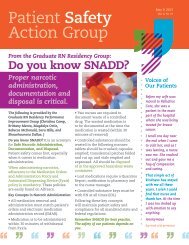Tdap Vaccine for New Mothers - Hartford Hospital!
Tdap Vaccine for New Mothers - Hartford Hospital!
Tdap Vaccine for New Mothers - Hartford Hospital!
You also want an ePaper? Increase the reach of your titles
YUMPU automatically turns print PDFs into web optimized ePapers that Google loves.
<strong>Tdap</strong> <strong>Vaccine</strong> <strong>for</strong> <strong>New</strong> <strong>Mothers</strong><br />
Special Deliveries Childbirth Center<br />
at Hart<strong>for</strong>d <strong>Hospital</strong><br />
Tetanus, Diphtheria, Pertussis (<strong>Tdap</strong>)<br />
What you need to know after the birth of your baby<br />
Why get vaccinated?<br />
The <strong>Tdap</strong> (Tetanus, Diphtheria, Pertussis) vaccine can protect<br />
adolescents and adults against three serious diseases.<br />
Tetanus, Diphtheria, and Pertussis are all caused by bacteria.<br />
Diphtheria and Pertussis are spread from person to person.<br />
Tetanus enters the body through cuts, scratches, or wounds.<br />
Tetanus (Lockjaw) causes painful tightening of the muscles,<br />
usually all over the body.<br />
• It can lead to “locking” of the jaw so the victim cannot open<br />
his mouth or swallow. Tetanus leads to death in up to two<br />
cases out of ten.<br />
Diphtheria causes a thick covering in the back of the throat.<br />
• It can lead to breathing problems, paralysis, heart failure,<br />
and even death.<br />
Pertussis (Whooping Cough) causes severe coughing spells,<br />
vomiting, and disturbed sleep.<br />
• It can lead to weight loss, incontinence, rib fractures and<br />
passing out from violent coughing, pneumonia, and<br />
hospitalization due to complications.<br />
In 2004 there were more than 25,000 cases of Pertussis in the U.S. More<br />
than 8,000 of these cases were among adolescents and more than 7,000<br />
were among adults. Up to two in 100 adolescents and five in 100 adults<br />
with Pertussis are hospitalized or have complications.<br />
<strong>Tdap</strong> and related vaccines<br />
<strong>Vaccine</strong>s <strong>for</strong> adolescents and adults<br />
• <strong>Tdap</strong> was licensed in 2005. It is the first vaccine <strong>for</strong><br />
adolescents and adults that protects against all three diseases.<br />
• Td (tetanus and diphtheria) vaccine has been used <strong>for</strong> many<br />
years as booster doses <strong>for</strong> adolescents and adults. It does not<br />
contain Pertussis vaccine.<br />
Why should I get <strong>Tdap</strong> vaccine after<br />
the birth of my baby?<br />
• Infants are at highest risk of complications and death related<br />
to Pertussis when compared to older age groups. Vaccinating<br />
adults who have contact with infants less than 12 months<br />
helps to prevent Pertussis in infants.<br />
• Adults who expect to have close contact with an infant<br />
younger than 12 months of age should get a dose of <strong>Tdap</strong>.<br />
• <strong>New</strong> mothers who have never received a dose of <strong>Tdap</strong> should<br />
get a dose as soon as possible after delivery, be<strong>for</strong>e hospital<br />
discharge. The vaccine is safe <strong>for</strong> breastfeeding mothers.<br />
continued...
Tetanus, Diphtheria, Pertussis (<strong>Tdap</strong>)<br />
Are there people who should not get <strong>Tdap</strong> vaccine<br />
or should wait?<br />
Anyone who has had a life-threatening allergic reaction after<br />
a dose of DTP, DTaP, DT or Td vaccine should not get <strong>Tdap</strong>.<br />
Anyone who has a severe allergy to any component of the<br />
vaccine should not get <strong>Tdap</strong>. Tell your health care provider<br />
if the person getting the vaccine has any known severe<br />
allergies.<br />
Talk with your doctor if the person getting the vaccine has<br />
a severe allergy to latex. Some <strong>Tdap</strong> vaccines should not be<br />
given to people with a severe latex allergy.<br />
• Anyone who went into a coma or had a long seizure within<br />
seven days after a dose of DTP or DTaP should not get <strong>Tdap</strong>,<br />
unless a cause other than the vaccine was found.<br />
• Talk with your doctor if the person getting the vaccine<br />
has epilepsy or another nervous system problem:<br />
had severe swelling or severe pain after a previous dose of<br />
any vaccine containing tetanus, diphtheria or Pertussis,<br />
has had Guillain Barré Syndrome (GBS).<br />
Anyone who has a moderate or severe illness on the day the shot is<br />
scheduled should usually wait until they recover be<strong>for</strong>e getting the<br />
vaccine. Those with a mild illness or low fever can usually<br />
be vaccinated.<br />
What are the risks from vaccines?<br />
A vaccine, like any medicine, could possibly cause serious<br />
problems, such as severe allergic reactions. However, the<br />
risk of a vaccine causing serious harm, or death, is extremely<br />
small.<br />
If rare reactions occur with any new product, they may not be<br />
identified until many thousands, or even millions, of people<br />
have used the product. Like all vaccines, <strong>Tdap</strong> is being closely<br />
monitored <strong>for</strong> unusual or severe problems.<br />
Clinical trials (testing be<strong>for</strong>e the vaccine was licensed)<br />
involved about 4,200 adolescents and about 1,800 adults.<br />
The following problems were reported. These are similar<br />
to problems reported after Td vaccine.<br />
Mild problems<br />
(noticeable, but did not interfere with activities)<br />
• Pain (about 3 in 4 adolescents and 2 in 3 adults)<br />
• Redness or swelling (about 1 in 5)<br />
• Mild fever of at least 100.4ºF (up to about 1 in 25<br />
adolescents and 1 in 100 adults)<br />
• Headache (about 4 in 10 adolescents and 3 in 10 adults)<br />
• Tiredness (about 1 in 3 adolescents and 1 in 4 adults)<br />
• Nausea, vomiting, diarrhea, stomach ache<br />
(up to 1 in 4 adolescents and 1 in 10 adults)<br />
• Other mild problems reported include chills, body aches,<br />
sore joints, rash, and swollen lymph glands.<br />
Moderate problems<br />
(Interfered with activities, but did not require medical attention)<br />
• Pain at the injection site (about 1 in 20 adolescents<br />
and 1 in 100 adults)<br />
• Redness or swelling (up to about 1 in 16 adolescents<br />
and 1 in 25 adults)<br />
• Fever over 102ºF (about 1 in 100 adolescents and 1 in 250 adults)<br />
• Nausea, vomiting, diarrhea, stomach ache<br />
(up to 3 in 100 adolescents and 1 in 100 adults)<br />
• Headache (1 in 300)<br />
Severe problems<br />
(Unable to per<strong>for</strong>m usual activities; required medical attention)<br />
• None were seen among adolescents.<br />
• In the adult clinical trial, two adults had nervous system<br />
problems after getting the vaccine. These may or may not<br />
have been caused by the vaccine. They went away on their<br />
own and did not cause any permanent harm.<br />
• A severe allergic reaction could occur after any vaccine. They<br />
are estimated to occur less than once in a million doses.<br />
A person who gets these diseases is more likely to have severe<br />
complications than a person who gets <strong>Tdap</strong> vaccine<br />
What if there is a severe reaction?<br />
What should I look <strong>for</strong>?<br />
• Any unusual condition, such as a high fever or behavior<br />
changes. Signs of a serious allergic reaction can include<br />
difficulty breathing, hoarseness or wheezing, hives,<br />
paleness, weakness, a fast heart beat or dizziness.<br />
What should I do?<br />
• Call a doctor, or get the person to a doctor right away.<br />
• Tell your doctor what happened, the date and time it<br />
happened, and when the vaccination was given.<br />
• Ask your doctor, nurse, or health department to report<br />
the reaction by filing a <strong>Vaccine</strong> Adverse Event Reporting<br />
System (VAERS) <strong>for</strong>m.<br />
Or you can file this report through VEARS website at<br />
www.vaers.hhs.gov, or by calling 1-800-822-7967.<br />
• For details about the National <strong>Vaccine</strong> Injury Com pensation<br />
Program, call 1-800-338-2382 or visit the website at<br />
www.hrsa.gov/vaccinecompensation.<br />
How can I learn more?<br />
• Ask your immunization provider. They can give you the<br />
vaccine package insert or suggest other sources of in<strong>for</strong>mation.<br />
• Call your local or state health department.<br />
• Contact the Centers <strong>for</strong> Disease Control and Prevention (CDC):<br />
-Call 1-800-232-4636 (1-800-CDC-INFO)<br />
-Visit CDC’s National Immunization Program website at<br />
www.cdc.gov/nip<br />
Special Deliveries Childbirth Center<br />
<strong>Vaccine</strong> In<strong>for</strong>mation Statement - Interim <strong>Tdap</strong> <strong>Vaccine</strong> (10/11)<br />
U.S.C/ 42 §300aa-26<br />
Adapted from 5/2007<br />
Department of Health and Human Services<br />
Centers <strong>for</strong> Disease Control and Prevention<br />
National Center <strong>for</strong> Immunization and Respiratory Disease<br />
HH-C-294_Sept11
















